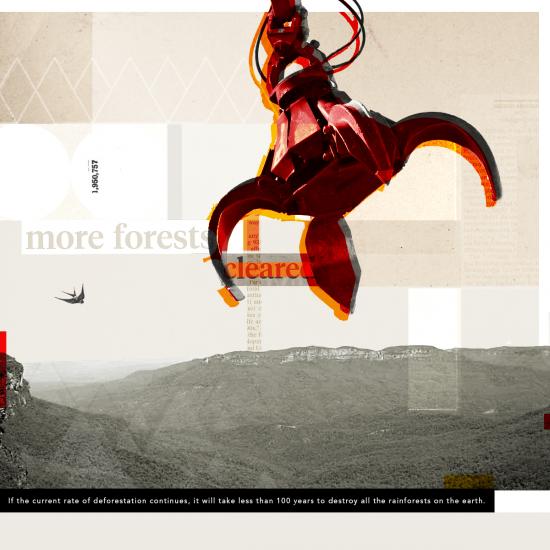Deforestation, a modern day plague
We make no secret of just how passionate we are about clean, green printing. We can't hide our love for the environment, we wear it wholeheartedly on our sleeve. And it's not just because we believe that environmentally conscious choices make good business sense. Sure, using recycled postcards and business cards can be just as cost efficient as their less eco friendly counterparts, but there's more at stake here. Planet earth is our shared resource and we all have a role to play in protecting it.

Digital collage by: Calan Stanley
Destroying natural habitats
Deforestation is the name given to the process by which the earth's natural forest environment is converted to non-forest land, either repurposed for other uses or destroyed and left as wasteland. Currently forests cover approximately 30 per cent of the world's land mass. But every year around 18 million acres of forest are destroyed or cut down, according to the United Nations Food and Agriculture Organization (FAO). That's 20 football fields of forest gone every single minute.
The paper industry has a huge responsibility here when you consider that 40 per cent of the world's commercially cut timber is processed for paper. That's a shocking amount of timber to be using when there is a much more environmentally friendly, yet just as affordable, alternative available.
Deforestation is such a scourge that National Geographic labelled it as the 'modern day plague'. It's estimated that if we continue our current rate of deforestation up to 28,000 species will become extinct within the next 25 years and all the remaining natural rainforests will have been wiped out in a hundred years time. Forests are the natural habitat of more than half of the earth's land animals and their homes are being destroyed at an alarming rate.
Global climate change
Unfortunately the bad news doesn't end there. Deforestation is also a massive contributor to the increasing rate of climate change. It has been reported to account for a massive 15 per cent of global greenhouse gas emissions. This is said by the World Wildlife Foundation (WWF) to include a whopping one-third of total carbon dioxide emissions caused by human actions.
On top of this we're losing one of our vital weapons in the fight to slow down global warming. Trees absorb the carbon emissions and greenhouse gases that have caused drastic climate change. As we erode our natural forest environment we inhibit our ability to fight global warming.
In our own backyard
Unfortunately in Australia the destruction of native forests for pulp and paper is still a huge problem despite a vast amount of recycled materials and
plantation wood being available.
In Victoria, the states emblem the Leadbeater Fairy Possum is actually facing extinction due to deforestation. According to The Wilderness Society less than 1,500 remain in the wild. Committed action such as the creation of 355,000 hectares of protected forests by The Great Forest National Park in the Central Highlands of Victoria is a great start and we all need to get involved in projects such as this.
It's not too late
All of this certainly is bad news for the environment, there's no doubt about it. But don't get too overwhelmed by the doom and gloom about the damage we've caused. It's not too late to arrest the problem. Every one of us, from the single individual, small businesses and mighty corporate machines, can make a positive difference today by recycling and using products and resources that are made from recyclable materials.
New York University notes that recycling just one 6-foot tall stack of newspapers will save one 35-foot tall tree. Recycling a whole tonne of newspapers saves 17 trees.
Recycling also reduces the space needed for landfills. So much of the paper that we use in our day-to-day lives is used in quick fleeting moments before making its way through the refuse system to ultimately end up taking up space in dumps. Reducing the amount of paper and ensuring that what paper we do use is recycled means we reduce our reliance on unsightly and harmful landfills.
So we don't see environmentally friendly and recycled paper as a worthy cause we like to support, we see it as an absolute necessity. Print Together from day one made a commitment to only use recycled papers, our house stock EcoStar is made from 100% post-consumer recycled fibre. We love our natural forests and would like to let them stay right where they are.
For more information about recycled paper visit: www.printtogether.com.au/environment/recycled-paper Also check our online printing services
Other resources:
The Wilderness Society's ethical paper pledge: www.ethicalpaper.com.au
The Great Forest National Park: www.greatforestnationalpark.com.au